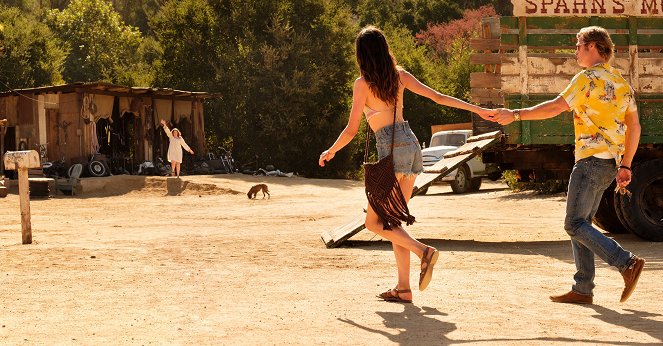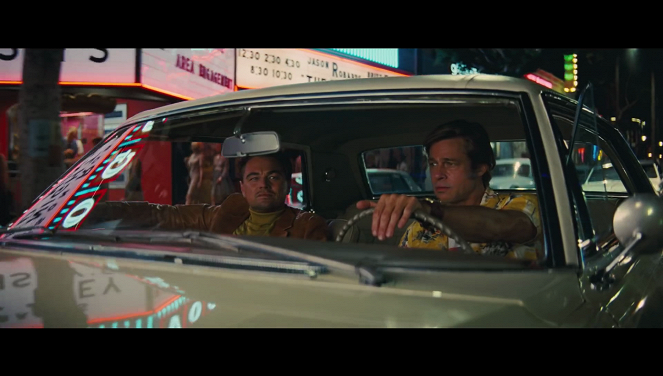Directed by:
Quentin TarantinoScreenplay:
Quentin TarantinoCinematography:
Robert RichardsonCast:
Leonardo DiCaprio, Brad Pitt, Margot Robbie, Emile Hirsch, Margaret Qualley, Timothy Olyphant, Julia Butters, Austin Butler, Dakota Fanning, Bruce Dern (more)VOD (4)
Plots(1)
Set in Hollywood in 1969, film star Rick Dalton (Leonardo DiCaprio) relies on his stunt double Cliff Booth (Brad Pitt) to make him look good. With his career rapidly failing, Dalton accepts a part in a Spaghetti Western that he believes is beneath him. When actress Sharon Tate (Margot Robbie) moves in to the house next door, Dalton sees her as a way back in to Hollywood. But after Charles Manson (Damon Herriman) pays them a visit, their plans for the future get put on hold. (Sony Pictures Home Entertainment)
(more)Videos (6)
Reviews (21)
As Tarantino stated in an interview with Time magazine, “I thought, we don’t need a story. They're the story.” It does not matter at all that Once Upon a Time in Hollywood is less spectacular that Tarantino’s previous films (with the exception of Jackie Brown, with which it shares a slow pace, melancholic mood and greater focus on the characters). More than on perfectly timed jokes, memorable one-liners, unexpected twists and building tension in long sequences, the film relies on the characters’ emotions (or what – like Sharon Tate – they symbolise), construction of a fictional world, the period atmosphere and the actors’ charisma. At the same time, it has an inventive three-act structure that serves well both as an evocation of the late 1960s in Los Angeles and another of Tarantino’s discussions over film/real violence and cinema as a means of living multiple lives in parallel and bringing that which has perished back to life. SPOILERS FOLLOW! From great details to greatness as a whole. From a poster-boy hero to a hero who saves actual lives. From Nazisploitation to exploitation inspired by the Manson Family. A recollection of an era when American films became more artsy (The Graduate, Easy Rider) under the influence of European cinema and more violent under the influence of the Vietnam War and turmoil on the streets (Bonnie and Clyde, The Wild Bunch). Tarantino’s use of those techniques (for example, jump cuts and long, hopeless drives as in films of the French New Wave) recalls the given period not only through music, set design and costumes, but also in formal terms. Conversely, classic Hollywood is represented by two burnt-out cowboys who, like the long-serving bosses of the major studios, do not understand young “fucking hippies” and, in the narrative that is newly taking shape, are condemned to play the roles of villains, with which they have no intention of reconciling themselves. However, the end of their era is inevitable. The protagonist of the cowboy movie that Rick reads is taken out of action roughly halfway through the story due to a hip injury. Cliff is likewise injured at the end of the film. Thus, at the end of Once Upon a Time in Hollywood, it seems that we are only halfway through Cliff and Rick’s story. Their fate is already sealed and though the conclusion of the film, while rectifying one tragedy, may seem to be a happy ending, we know that the heroes do not come out of it well (the fact that Trudi Fraser/Jodie Foster reads a biography of the, for her, brilliant Walt Disney, whose racism and anti-Semitism will begin to be addressed many years later, has a similar maliciousness). In my opinion, the key to the cohesiveness of the narrative and understanding of the story lies in the blending together or, more appositely, doubling of the individual planes of this fictional world and their relationship to actual historical events that play a significant role in shaping our expectations and emotional response. We see Sharon Tate as she was depicted in period promotional videos and photographs (the fact that someone is looking at her, amplifying her unreachability, is accentuated throughout the film, though particularly during the Playboy party, when McQueen comments on her from afar). In the only scene where Sharon herself is watching, we actually watch Margot Robbie, admiring her murdered acting colleague on the screen. Cliff, peculiarly behind the movie screen (of a drive-in cinema), represents a truer version of Rick, as he endures actual blows for Rick and does the work that makes it possible for him to exist in the world of film and television (if he hadn’t repaired the television antenna, they would not be able to watch Rick’s cameo at the FBI). The heroes exist through stories in which they also play stories told about them, which – this is essential for Tarantino’s narrative concept – we do not always know whether they are true (did Cliff kill his wife or not?). Lines delivered in the context of a role have an impact on what happens in the characters’ lives (Rick as DeCoteau tells Luke Perry’s character that he will send his man to his ranch – we subsequently see Cliff coming to Spahn Ranch). The climax of breaking down the boundaries between the real and the possible is Cliff’s encounter with a trio of murderers, whose genuineness he doubts under the influence of LSD. His dog, which is basically the only one that does not play any role, but just simply is (a dog), has no doubts and will do the lion’s share of the work in eliminating the intruders. The relationship between film and reality, the actor and his role, and violence and its representation in the media has always fascinated Tarantino, at least as much as women’s feet. This time, he plays with the transitions between one and the other perhaps even more ingeniously than ever before, and even after two viewings, I still do not feel (not by a long shot) that I would be able to grasp and uncover everything that the film has to offer. 90%
()
(less)
(more)
Tarantino's worst film and one of the most tiring cinema experiences ever. There are only two things to praise about this film, namely the decent retro styling and the perfect performances of Brad Pitt and Leonardo DiCaprio, the rest is not even worth mentioning. Bruce Lee is in the film for two minutes and it's no wonder the daughter is upset for the travesty they put him on. Charles Manson is in the film for five seconds! (and it’s what the film was originally supposed to be about) And the alluring Margot Robbie is in the film for about eight minutes total. So more or less, it’s two and a half hours of bullshit about something that I don't give a shit about. But I don't care at all, and I could still get over the fact that Tarantino ditched the action, but to ditch the humour as well? Well, that deserves punishment. It's saved a little by the ending, which Pitt steals for himself, and at least in the last ten minutes Tarantino makes it clear that he's the director, but that’s not enough with a three-hour running time. My friends gave up on the film halfway through. This one passes me by. 40%
()
It's so long. It’s like inhaling the smoke from a filter-less cigarette and enjoying its equally long exhalation. It won't make you cough, and it won't scratch your throat. Which is actually the only problem I have with this "California dream". Connoisseurs of Tarantino's work will soon suspect that history will change again, and this time it is far less subversive fun than Inglorious Bastards. The three-pointed storytelling (actor-stuntman-Sharon Tate) does not have the exact structure of The Hateful Eight, but is rather an episodic collection of stories from filming and enchanted memories of faded neon. Once Upon a Time in Hollywood is not the best that Tarantino has to offer, which does not mean that after the end of the I won’t be madly in love with the corked smile of Cliff Booth and dividing the 162 minutes by three, because that’ show fast the film went by. You won't resist the urge to see it again, even if you already know what’s going to happen...
()
By far this is the best movie by the video store freak since Jackie Brown, not least because it doesn't resemble a classic Tarantino film, and because the great Quentin kind of surpassed all his bloodthirsty movies. Those who expected the typical gory carnage, got mature filmmaking, where Tarantino works sparingly with the pace, doesn't rush anywhere, caresses every scene, every line (the scenes with Sharon Tate in the cinema, or the wise little girl are the best). In the very end, however, Quentin unfortunately breaks free from his chain and in the (literally) explosive finale he shows us all that the good old morbid man is behind the camera after all, just so we don't forget. Pomo here says the finale was wonderful, for me it was the weakest link in an otherwise great film. Finally, a quick note: it would be good to have at least some awareness of who Roman Polanski and Sharon Tate are (were), and their influence on late 60s pop culture. Not like the cow in the cinema next to me who at the end said: “What was that blond girl doing there? She was pointless!” PS: Those beautiful Rick Dalton posters had the exact same graphic feel as the posters for the spaghetti westerns available on Wrong Side of the Art. Yeah, and it's too bad I'm straight, otherwise I'd hang a poster of Brad Pitt from this movie on my bedroom wall :o)
()
It’s Quentin Tarantino’s ninth film and nothing changed in his storytelling. It’s true that he tuned his hubris down a bit so we don’t see any 40-minute scenes with zero content, as was the case with The Hateful Eight. But it's still exactly the kind of movie you can expect from Tarantino. It‘s three hours long, with nothing happening for the first two hours, and the last 40 minutes are so full of suspense you will watch it with bated breath. Quentin strategically chose a new topic – Hollywood, but it’s actually just Pulp Fiction in a new coat. This movie seems likes Quentin Tarantino’s opus magnum. He portrays a period he obviously likes the most from Hollywood history – the Western era – and makes allusions to everything that comes to his mind. And he doesn’t care a bit if you like that era, have seen those movies or are their fan at all. He just does what he wants, and it fascinates me how much time and effort he had to invest in shooting scenes from various imaginary films, creating their posters and names. If nothing else, this makes Once Upon a Time in Hollywood a remarkable movie. Plus Leonardo DiCaprio and Brad Pitt are a pair of cool guys who can’t let Tarantino’s fans down. It still, however, seems just like a film where a group of actors meet to have some fun together, most of all Leo and Brad. You feel like you went to grab a beer with them, took a peek into their lives, and in the last part of the film you got to see some traditional Tarantino action, which is just as wild and brutal as we’re used to. In short, nothing new under the sun.
()
Gallery (113)
Photo © Sony Pictures Entertainment


